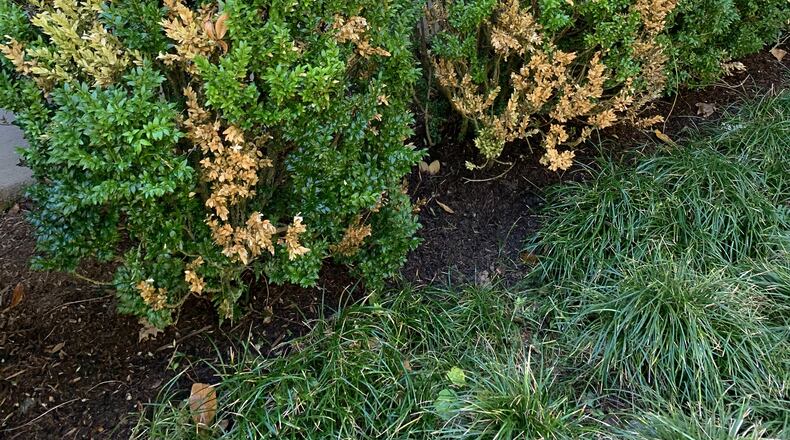Q: My dwarf boxwoods have brown branches on plants scattered in the bed. I am so afraid this is boxwood blight! What should I do to stop it? Nancy Cox, email
A: Your first task is to find out exactly what disease is present. There are several that kill boxwood branches. The University of Georgia Extension plant disease clinic can take a sample of leaves and diagnose the disease. Contact your local Extension office at 800-ASKUGA1 (800-275-8421) for instructions. They can advise on how to treat any disease your boxwoods might have.
Q: My beds throughout my front and back yard have a lot of mulberry weeds in them. I’d rather not use Roundup near them. Do you have suggestions of what I can do to kill the weeds in summer? Mary Greer, email
A: Sure! You are correct that glyphosate (the active ingredient in Roundup) can volatilize under plants and hurt the leaves. Organic weed killers that contain ammoniated salts of fatty acids (Weed-Aside, Finalsan, Monterey Herbicidal Soap) or chelated iron (Fiesta, Iron-X) would allow spraying near flowers and vegetables without volatilizing. I would not use organic herbicide that contains clove oil or cinnamon oil. These products have the possibility of evaporating and damaging plants.
Q: Big divots have appeared in our recently aerated lawn. It is a real mess. We think some animal, like a raccoon, is eating grubs as it digs. Frankie Haverty, Dunwoody
A: Your theory of raccoons eating grubs is a good guess. The white C-shaped grubs of Japanese beetles are getting larger now as they prepare to dig deeper underground to ride out winter. You could try applying a grub poison, but I can’t guarantee it will be effective on the larger grubs. Trapping raccoons is not a good idea either. Besides the need for specific training on raccoon trapping, you have to decide what you’ll do with the animal once caught. Raccoons may be released only on private land, with permission of the owner. Though you might think that trapping and release is humane, these animals will likely die due to unfamiliarity with local sources of food, water and shelter.
Q: How much chilling do tulip bulbs need in order to bloom in early April? Lisa Fredricksen, email
A: Tulip bulbs need to experience eight to 16 weeks of temperatures below 40 degrees in order to bloom properly. North Georgia has plenty of hours when garden soil is cool enough to put tulips into a blooming frame of mind. Plant your bulbs after mid-October and they will bloom fine in April.
Email Walter at georgiagardener@yahoo.com. Listen to his occasional garden comments on “Green and Growing with Ashley Frasca” Saturday mornings on 95.5 WSB. Visit his website, www.walterreeves.com, or join his Facebook Page at bit.ly/georgiagardener, for his latest tips.
About the Author
The Latest
Featured

